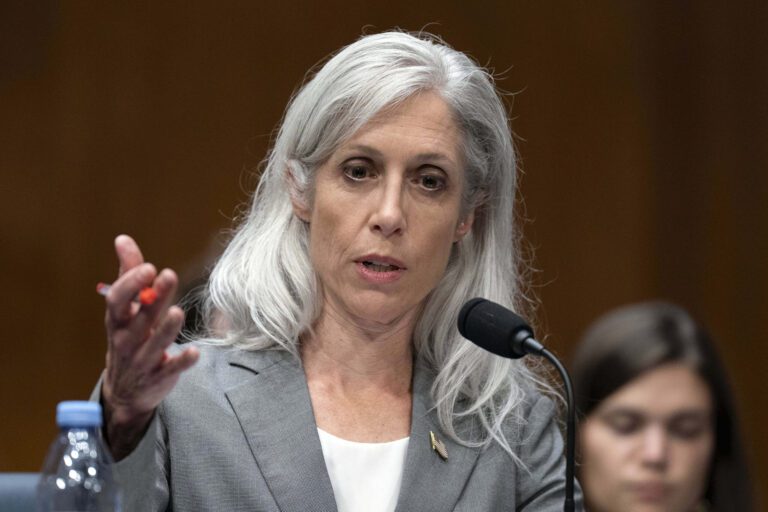Controversy Erupts at Senate Health Committee: Ousted CDC Director’s Testimony Sparks Debate
Background of the Hearing
On Wednesday, former Director of the Centers for Disease Control and Prevention (CDC), Dr. Susan Monarez, testified before the Senate Health Committee concerning her contentious dismissal by Secretary of Health Robert F. Kennedy Jr. Her claims have ignited a storm of debate surrounding the administration of childhood vaccinations and the integrity of CDC operations.
Key Allegations
During her testimony, Dr. Monarez recounted an intense meeting with Secretary Kennedy, where he accused CDC staff of “killing children” in response to her refusal to “pre-commit” to changes he proposed for the childhood vaccine schedule. Here are some critical points raised in her statements:
- Allegations Against CDC Employees: Kennedy’s incendiary comments aimed at CDC employees included accusations of endangering children’s lives.
- Vaccine Schedule Manipulation: Kennedy allegedly asked Dr. Monarez to approve every recommendation from an Advisory Committee on Immunization Practices (ACIP) he appointed, disregarding any scientific validation.
Quotes from Dr. Monarez
"He just wanted blanket approval, and if I could not commit to approval of each and every one of the recommendations that would be forthcoming, I needed to resign," stated Dr. Monarez.
Dr. Monarez was ultimately fired just two days later, on August 27, after being labeled “untrustworthy” by Kennedy.
The Political Landscape
Chairman of the committee, Senator Bill Cassidy (R-LA), expressed his frustration with Kennedy’s actions. The recent hearing aligns with the Trump administration’s call for "radical transparency" in healthcare governance. Cassidy has been critical of Kennedy’s overhaul of the previous ACIP board, which was replaced with members skeptical of vaccinations.
Newly Appointed ACIP Members
- Catherine Stein: Professor from Case Western, known for her opposition to COVID-19 mandates.
- Martin Kuldorff: A vocal critic of vaccination mandates and former ACIP chair.
Cassidy emphasized the need for trust in CDC communications among healthcare professionals:
“If doctors do not have clear guidance or have a reason to distrust what’s coming out of the CDC, they cannot make informed decisions to protect their patients,” he said.
Heated Exchanges
The Senate hearing revealed a contentious atmosphere, particularly as Republicans grilled Dr. Monarez about her integrity and her choice of legal counsel. Senator Rand Paul (R-KY) took issue with the CDC’s stance on childhood vaccinations, demanding justification for vaccine mandates for infants.
Noteworthy Exchanges
Dr. Monarez responded to Paul’s accusations:
“I actually agree with you, and I was open to the science, I just would not pre-commit to approving all the ACIP recommendations without the science.”
Paul countered her assertion, suggesting that the burden of proof lay with Monarez and her colleagues.
Resignation Protests and Inaccuracies
Dr. Debra Houry, a former CDC chief medical officer who resigned in protest, further criticized Kennedy’s administration. She noted that neither she nor the official responsible during a surge of measles cases were consulted on crucial matters.
Dr. Houry pointed out:
“He said things like vaccines had fetal parts, and I had to send a note to our leadership team to correct that misinformation.”
Implications for Public Health Policy
Dr. Monarez, who made history as the first CDC director without a medical degree since 1953, presided over a surge in vaccine skepticism, highlighted by a tragic shooting incident at the Atlanta headquarters motivated by vaccine mistrust.
As discussions continue, Dr. Cassidy cautioned that altering the Hepatitis B vaccine recommendation could reverse decades of public health progress. Hepatitis B poses significant risks, especially when contracted during childhood:
- Chronic Condition Development: Approximately 90% of childhood cases can develop into chronic conditions.
“That is an accomplishment to make America healthy again, and we should stand up and salute the people that made that decision because there are people who would otherwise be dead if those mothers were not given that option to have their child vaccinated,” Cassidy emphasized at the hearing.
Conclusion
The fallout from Dr. Monarez’s testimony illustrates the contentious atmosphere surrounding vaccination policies in the current administration. As the Senate Health Committee continues to navigate these complex issues, the implications for public trust in health guidelines remain crucial. For more information on vaccination guidelines, visit the CDC Vaccination Page.
By utilizing structured details and insightful quotes, this article aims to provide a comprehensive overview of the recent Senate hearing while optimizing for search engines.


